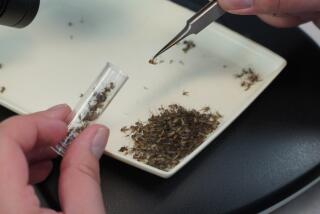Flood of Mosquitoes the Latest Calamity to Plague the Midwest
DES MOINES — First came the flood. Now come the mosquitoes.
The standing water across the Midwest has become a breeding ground for mosquitoes, sending people scurrying indoors--or to the store for bug spray.
Jason Bishop went to rescue his boat from the Skunk River near Mt. Pleasant and was overwhelmed.
“As soon as we pulled in they were all over the windshield of the truck--I mean all over the truck,” he said. “They chowed like crazy. We came out with a lot of bites.”
“This has been a banner year for mosquitoes. The flooding will just make it worse,” said George Craig Jr., an expert at the University of Notre Dame. “Where you have water a couple of inches deep in woods or grass, you have generations of mosquitoes laying eggs.”
Rear Adm. Frank Young of the Public Health Service said in Jefferson City, Mo., this week that the mosquitoes so far are a “nuisance and not a disease problem.” Mosquitoes can spread encephalitis and other dangerous diseases.
The bugs hatching now are “very aggressive biters, but are not of the type that will carry disease,” said Ken Senger of the South Dakota Health Department. But other varieties could emerge if the stagnant water persists into the fall, he said.
Health officials in several states plan to trap mosquitoes and wild birds to check for signs of infectious diseases, as well as ask veterinarians to watch for mosquito-borne illnesses in farm animals, often the first victims.
Insect repellent has been flying off the shelves at Casey’s General Store in Mt. Pleasant, cashier Kari Long said.
Experts note that the cool, wet weather has probably slowed major hatches in the Midwest. While mosquitoes lay their eggs in water, they hatch when the weather turns warmer and drier.
To eliminate breeding areas, people are advised to remove any standing water, especially in old tires, wheelbarrows and garbage cans.
“At least stir the water up a bit,” said Kevin Teale, spokesman for the Iowa Health Department. If that doesn’t work, he advised, “cover yourself with netting for the next six months.”
More to Read
Sign up for Essential California
The most important California stories and recommendations in your inbox every morning.
You may occasionally receive promotional content from the Los Angeles Times.








